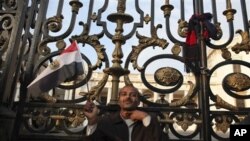The U.S. House Committee on Foreign Affair has held a hearing on implications for U.S. foreign policy of recent events in Egypt and Lebanon. Middle East experts advised the panel that Congress and the Obama administration should send a strong message to the Egyptian military that further U.S. aid will be contingent on the military's respect for the rights of protesters and its support for a democratic transition.
Many of the lawmakers at Wednesday's hearing praised the Egyptians who have taken to the streets to call for democratic change and for Egyptian President Hosni Mubarak to step down. Democratic Congressman Gary Ackerman of New York called on President Barack Obama to make clear that the U.S. government stands with the protesters.
"The people yearn to be free," said Ackerman. "How refreshing is it to see people who are not trampling our flag in the streets as they raise theirs? How inspiring is it to see people in that part of the world ready to die for their children's future instead of sending their children off to die? The people yearn to be free. We must plant ourselves firmly on their side."
One of the key roles Congress plays in forging U.S. foreign policy is in approving or blocking foreign aid. Republican House Foreign Affairs Committee Chairwoman Ileana Ros-Lehtinen said successive U.S. governments have failed to heed calls from lawmakers to make U.S. economic and military aid contingent on respecting human rights. She said Washington is making the same mistake in Egypt and Lebanon, where the militant group Hezbollah is playing an increasing role in government.
"Washington is also persisting in continuing to provide assistance to a Lebanese government in which Hezbollah essentially had veto power," said Ros-Lehtinen.
Ros-Lehtinen added that the U.S. needs to pursue a long-term strategy of supporting democratic groups in the Middle East and elsewhere.
Elliott Abrams of the Council on Foreign Relations research group said it is time for the United States to bring its financial aid leverage to bear.
"I think we should make clear to Egypt's military right now that the $1 billion a year they get is not owed to them," said Abrams. "Their conduct will determine how much aid they get."
Robert Satloff of The Washington Institute for Near East Policy said he believes the Obama administration's policy on the protests in Egypt has been sound so far, and agreed that military aid should be linked to positive change.
"The administration correctly supported the idea of change, and the democratic spirit at the heart of the protests, while operating on the basis of the not unreasonable assessment that the Egyptian military was and perhaps remains the key to resolving a national crisis that has put millions of protesters against an increasingly isolated and stubborn president," said Satloff.
All of the experts on the panel agreed that the United States should not cut off aid to the Egyptian military right now, but wait and see if the military chooses to be an agent of democratic change.
Experts Say US Should Link Military Aid to Egypt to Democratic Transition
- By Cindy Saine




